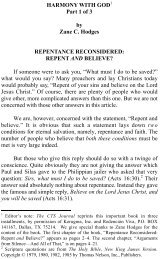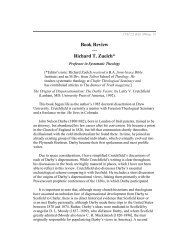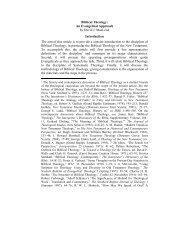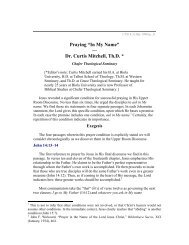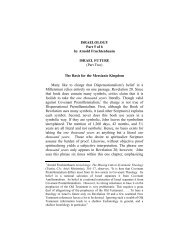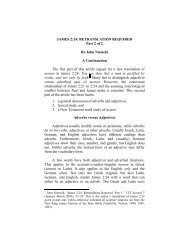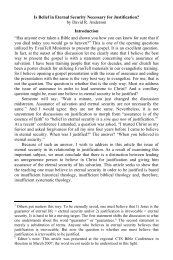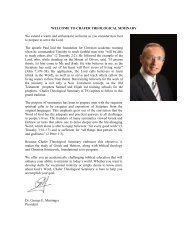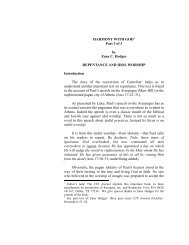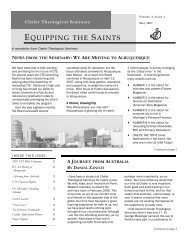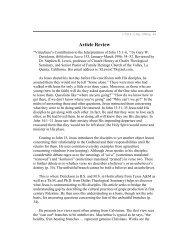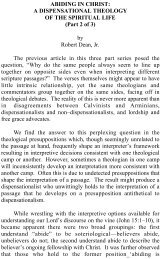Israel's Inheritance: Birthright of the Firstborn Son - Chafer ...
Israel's Inheritance: Birthright of the Firstborn Son - Chafer ...
Israel's Inheritance: Birthright of the Firstborn Son - Chafer ...
Create successful ePaper yourself
Turn your PDF publications into a flip-book with our unique Google optimized e-Paper software.
82 CTS Journal 13 (Spring 2008)<br />
study will demonstrate, <strong>the</strong> greater portion <strong>of</strong> inheritance assisted <strong>the</strong> son with<br />
<strong>the</strong> birthright to perform his responsibility <strong>of</strong> leadership.<br />
Redemption <strong>of</strong> <strong>the</strong> <strong>Firstborn</strong> <strong>Son</strong><br />
Although <strong>the</strong> concept <strong>of</strong> <strong>the</strong> birthright in Scripture is similar in many ways to<br />
legal practices affecting firstborn sons in <strong>the</strong> surrounding cultures, <strong>the</strong> Hebrew<br />
Bible develops one aspect <strong>of</strong> <strong>the</strong> inheritance that is different from those <strong>of</strong><br />
Israel’s neighbors. It originates in <strong>the</strong> exodus event. The Hebrew text highlights<br />
God’s rescue <strong>of</strong> <strong>the</strong> children <strong>of</strong> Israel, His firstborn son, from death and<br />
destruction that fell upon all <strong>the</strong> o<strong>the</strong>r firstborn in Egypt, both people and<br />
animals. 11<br />
The Hebrew narrative fur<strong>the</strong>r develops <strong>the</strong> importance <strong>of</strong> <strong>the</strong> firstborn in<br />
three ways. First, <strong>the</strong> text notes <strong>the</strong> special status <strong>of</strong> all firstborn sons by<br />
consecration, which sets apart <strong>the</strong> firstborn as sacred and holy. Sanctification <strong>of</strong><br />
firstborn animals was for <strong>the</strong> purpose <strong>of</strong> sacrifice. We will see that sanctification<br />
<strong>of</strong> <strong>the</strong> firstborn children <strong>of</strong> Israel was for service, which is a living sacrifice.<br />
“Consecrate to Me all <strong>the</strong> first-born, <strong>the</strong> first <strong>of</strong>fspring <strong>of</strong> every womb among <strong>the</strong><br />
sons <strong>of</strong> Israel, both <strong>of</strong> man and beast; it belongs to Me” (Exodus 13:2). “The<br />
first-born <strong>of</strong> an ox or <strong>the</strong> first-born <strong>of</strong> a sheep or <strong>the</strong> first-born <strong>of</strong> a goat, you shall<br />
not redeem; <strong>the</strong>y are holy. You shall sprinkle <strong>the</strong>ir blood on <strong>the</strong> altar and shall<br />
<strong>of</strong>fer up <strong>the</strong>ir fat in smoke as an <strong>of</strong>fering by fire, for a soothing aroma to <strong>the</strong><br />
Lord” (Numbers 18:17).<br />
Second, after God redeemed <strong>the</strong> children <strong>of</strong> Israel from death in Egypt, <strong>the</strong><br />
Hebrew Scriptures portray an ongoing need for redemption <strong>of</strong> <strong>the</strong> firstborn son.<br />
The redemption in Egypt followed <strong>the</strong> placement <strong>of</strong> blood from a sacrificed<br />
animal on <strong>the</strong> doorpost. Continuing redemption also involved animal sacrifice. 12<br />
The text explains this need for continuing redemption.<br />
When in <strong>the</strong> future your child asks you, “What does this mean?” you<br />
shall answer, “By strength <strong>of</strong> hand <strong>the</strong> Lord brought us out <strong>of</strong> Egypt,<br />
from <strong>the</strong> house <strong>of</strong> slavery. When Pharaoh stubbornly refused to let us go,<br />
<strong>the</strong> Lord killed all <strong>the</strong> firstborn in <strong>the</strong> land <strong>of</strong> Egypt, from human<br />
firstborn to <strong>the</strong> firstborn <strong>of</strong> animals. Therefore I sacrifice to <strong>the</strong> Lord<br />
every male that first opens <strong>the</strong> womb, but every firstborn <strong>of</strong> my sons I<br />
redeem.” (Exodus 13:14–15)<br />
cultures for evidence <strong>of</strong> <strong>the</strong> birthright and found that authors treated <strong>the</strong> inheritance <strong>of</strong> <strong>the</strong><br />
firstborn son in a preferential manner. He concludes that <strong>the</strong>re is insufficient data to<br />
determine a definitive ratio but adds that a double portion is evident in <strong>the</strong> texts he<br />
examined. Davies concludes that we should retain <strong>the</strong> traditional understanding <strong>of</strong> a<br />
double portion.<br />
11 Exod. 6:6; cf. Ps. 103:4; Isa. 44:22–23; 63:9.<br />
12 The most noted example in <strong>the</strong> Hebrew Scriptures is <strong>the</strong> substitution <strong>of</strong> a lamb for<br />
Abraham’s near sacrifice <strong>of</strong> Isaac. The New Testament fur<strong>the</strong>r develops this concept <strong>of</strong><br />
substitution. For example, 1 Cor. 5:7 explains that “Christ our Passover also has been<br />
sacrificed.”



